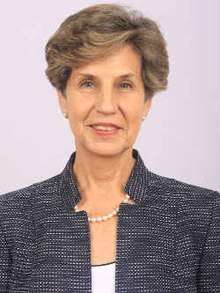Isabel Allende (politician)
Isabel Allende Bussi (US: /ɑːˈjɛndeɪ, -di/,[1][2] UK: /æˈ-, aɪˈɛn-/,[3][4] Spanish: [isaˈβel aˈʝende] (![]()
María Isabel Allende | |
|---|---|
 | |
| President of the Chilean Senate | |
| In office 11 March 2014 – 11 March 2015 | |
| Deputy | Eugenio Tuma |
| Preceded by | Jorge Pizarro |
| Succeeded by | Patricio Walker |
| Senator for Atacama | |
| Assumed office 11 March 2010 | |
| Preceded by | Ricardo Núñez |
| Leader of the Socialist Party of Chile | |
| In office 17 May 2015 – 9 April 2017 | |
| Preceded by | Osvaldo Andrade |
| Succeeded by | Álvaro Elizalde |
| President of the Chilean Chamber of Deputies | |
| In office 18 March 2003 – 16 March 2004 | |
| Preceded by | Adriana Muñoz |
| Succeeded by | Pablo Lorenzini |
| Member of the Chilean Chamber of Deputies | |
| In office 11 March 1994 – 11 March 2010 | |
| Personal details | |
| Born | 18 January 1945 Santiago, Chile |
| Nationality | Chilean |
| Political party | Socialist Party of Chile |
| Children | 2 |
| Parents | |
| Relatives | Allende family |
| Alma mater | University of Chile |
| Profession | Sociologist |
| Website | Official website |
Biography
She went to the Maisonette College, and unlike her sisters, was initially attracted to the Catholic Church and received her first communion. In 1962, at the age of 17 she began studying sociology, and joined the university's socialist brigade. Five years later she accompanied her father to the congress of the Socialist Party in Chile.
Her first marriage, with Sergio Meza, did not last for long, but they had a son, Gonzalo [6]. With her second husband, Romilio Tambutti, she had a daughter named Marcia.
On 11 September 1973, the day of the military coup led by General Augusto Pinochet, Isabel was the last person to enter the presidential palace. After the military began to bomb the presidential palace, and the outcome was already clear, her father ordered the women to leave.
Isabel obtained political asylum in Mexico, with her mother and sister, where she spent sixteen years in exile, before returning to Chile in 1989, in the final stretch of the military regime.
On returning to her homeland, Allende began a successful political career; after Chile's return to democracy in 1990, she was elected as a member of the Chamber of Deputies, serving as its President between 2003 and 2004, becoming the second woman to do so after Adriana Muñoz.
On 16 December 2010, her son Gonzalo Meza Allende committed suicide after suffering depression.[7][8]
See also
References
- "Allende". Collins English Dictionary. HarperCollins. Retrieved 27 July 2019.
- "Allende Gossens". Merriam-Webster Dictionary. Retrieved 27 July 2019.
- "Allende, Salvador". Lexico UK Dictionary. Oxford University Press. Retrieved 27 July 2019.
- "Allende, Isabel". Longman Dictionary of Contemporary English. Longman. Retrieved 20 August 2019.
- Isabel Allende chosen as first woman to lead Chile's senate, Associated Press, The Guardian, 28 February 2014
- http://www.caras.cl/politica/isabel-allende-bussi-su-historia-secreta/
- "Conmoción política por trágica muerte de hijo de la senadora Isabel Allende". La Segunda (in Spanish). December 16, 2010. Retrieved March 22, 2018.
- Kirschbaum, Ricardo, ed. (December 17, 2010). "Se suicidó el nieto de Allende". Clarín (in Spanish) (25971). Retrieved March 22, 2018.
External links
- Official website (Spanish)
![]()
- Biography from the Chilean National Congress
- New York Times on exhumation of Salvador Allende